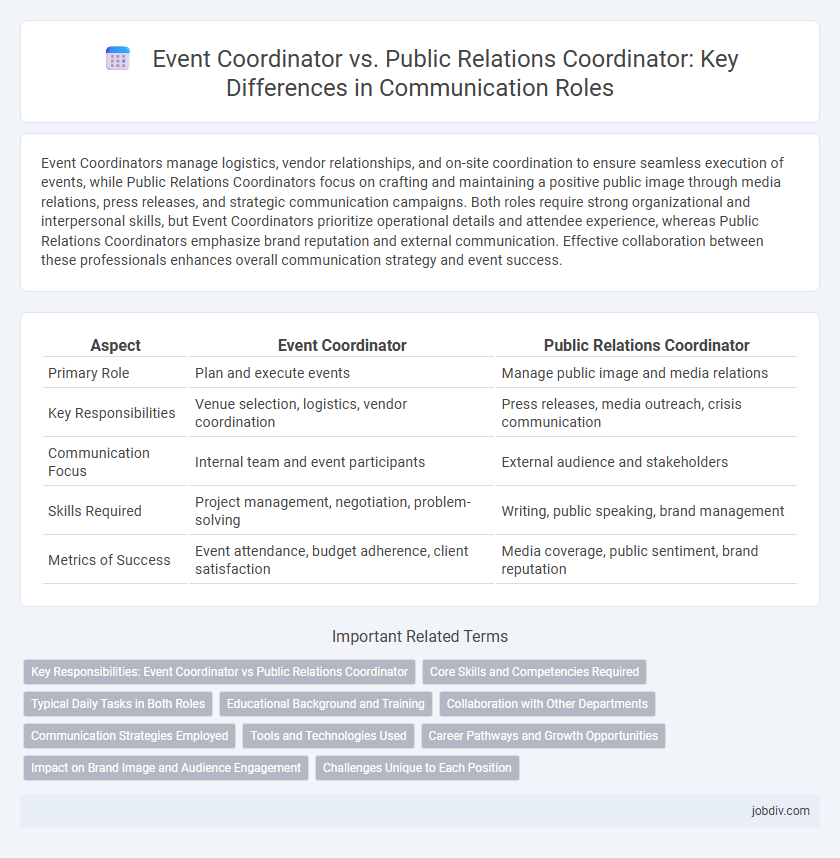Event Coordinators manage logistics, vendor relationships, and on-site coordination to ensure seamless execution of events, while Public Relations Coordinators focus on crafting and maintaining a positive public image through media relations, press releases, and strategic communication campaigns. Both roles require strong organizational and interpersonal skills, but Event Coordinators prioritize operational details and attendee experience, whereas Public Relations Coordinators emphasize brand reputation and external communication. Effective collaboration between these professionals enhances overall communication strategy and event success.
Table of Comparison
| Aspect | Event Coordinator | Public Relations Coordinator |
|---|---|---|
| Primary Role | Plan and execute events | Manage public image and media relations |
| Key Responsibilities | Venue selection, logistics, vendor coordination | Press releases, media outreach, crisis communication |
| Communication Focus | Internal team and event participants | External audience and stakeholders |
| Skills Required | Project management, negotiation, problem-solving | Writing, public speaking, brand management |
| Metrics of Success | Event attendance, budget adherence, client satisfaction | Media coverage, public sentiment, brand reputation |
Key Responsibilities: Event Coordinator vs Public Relations Coordinator
Event Coordinators specialize in planning, organizing, and managing logistics for events, ensuring seamless execution from venue selection to vendor coordination and attendee experience. Public Relations Coordinators focus on crafting and distributing press releases, managing media relations, and building brand reputation through strategic communication campaigns. Both roles require strong interpersonal skills, but Event Coordinators prioritize operational details while Public Relations Coordinators emphasize message control and media engagement.
Core Skills and Competencies Required
Event Coordinators require strong organizational skills, attention to detail, and the ability to manage logistics, timelines, and vendor relations efficiently. Public Relations Coordinators need expertise in media relations, strategic communication, and crisis management to maintain and enhance a company's public image. Both roles demand excellent interpersonal skills and adaptability, but Event Coordinators emphasize project execution while Public Relations Coordinators focus on message crafting and brand reputation.
Typical Daily Tasks in Both Roles
An Event Coordinator manages logistical details such as venue selection, vendor negotiations, and on-site event execution to ensure seamless event delivery. A Public Relations Coordinator focuses on crafting media releases, monitoring public perception, and organizing press events to maintain a positive brand image. Both roles involve stakeholder communication and deadline management but emphasize different aspects of strategic outreach and operational planning.
Educational Background and Training
Event Coordinators typically hold degrees in event management, hospitality, or communications, emphasizing project planning and logistics. Public Relations Coordinators usually have educational backgrounds in public relations, marketing, or journalism, focusing on media relations, writing, and strategic communication. Training for Event Coordinators includes hands-on event execution and vendor negotiation, while Public Relations Coordinators receive specialized instruction in press release development, crisis management, and brand messaging.
Collaboration with Other Departments
Event Coordinators collaborate closely with marketing, logistics, and finance departments to ensure seamless execution of events, aligning all aspects from budgeting to vendor management. Public Relations Coordinators work in tandem with media, legal, and executive teams to craft consistent messaging and manage the organization's public image. Both roles require strategic interdepartmental communication to enhance brand visibility and achieve organizational goals.
Communication Strategies Employed
Event Coordinators focus on communication strategies that emphasize real-time audience engagement and logistical clarity, utilizing tools like event apps, social media live updates, and direct attendee messaging to ensure seamless event flow. Public Relations Coordinators implement communication strategies centered on brand image and media relationships, leveraging press releases, media kits, and targeted storytelling to shape public perception and manage reputation. Both roles require tailored communication approaches, with Event Coordinators prioritizing operational coordination and Public Relations Coordinators focusing on strategic narrative control.
Tools and Technologies Used
Event Coordinators utilize project management software like Asana and Trello to organize logistics, along with event-specific platforms such as Eventbrite and Cvent for registration and ticketing. Public Relations Coordinators leverage media monitoring tools like Meltwater and Cision to track press coverage, and social media management platforms such as Hootsuite or Sprout Social for audience engagement and campaign analysis. Both roles increasingly incorporate analytics software to measure event success and public sentiment, enhancing strategic communication efforts.
Career Pathways and Growth Opportunities
Event Coordinators typically advance by gaining experience in large-scale event planning and project management, often progressing to roles such as Event Manager or Director of Events. Public Relations Coordinators focus on media relations, brand management, and strategic communication, with growth opportunities leading to positions like PR Manager or Communications Director. Both career pathways offer specialized skill development, but PR roles generally provide broader organizational influence and opportunities in corporate communication strategies.
Impact on Brand Image and Audience Engagement
An Event Coordinator directly influences brand image by designing memorable experiences that enhance audience engagement through live interactions and immersive activities. A Public Relations Coordinator shapes brand perception via strategic communication campaigns and media relations, fostering trust and credibility with broader audiences. Both roles are crucial for brand visibility, with Event Coordinators driving immediate personal connections and PR Coordinators managing sustained reputation and public narrative.
Challenges Unique to Each Position
Event Coordinators face challenges in logistical planning, vendor management, and real-time problem solving during events, ensuring seamless execution under tight deadlines. Public Relations Coordinators encounter difficulties in media relations, crisis communication, and maintaining a consistent brand image across diverse platforms. Both roles require strong interpersonal skills but differ in their focus on tactical event management versus strategic reputation building.
Event Coordinator vs Public Relations Coordinator Infographic

 jobdiv.com
jobdiv.com